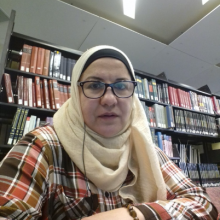Every year, the Department of Women’s, Gender, and Sexuality Studies hosts a Showcase for our graduate students’ MA Final Projects, the capstone of their graduate education before earning their degrees. We are especially proud of this year’s cohorts who presented some of the most innovative and thought-provoking projects to come out of the department. Reflecting interdisciplinary topics, transnational subjects, and diverse perspectives on race, gender, and sexuality, our MA students continue to shine as exemplars of inclusive excellence.
Intelligible Genders, Imagined Others: Interrogating the “Third Gender” in Indonesia’s Past and Present

This research comprises a critical discourse analysis, which investigates contemporary Anglo-American research on gender variant subjects in pre-colonial, colonial, and postcolonial Indonesia. Using Judith Butler’s concept of “gender intelligibility” (1991) and Nancy Tuana’s “epistemology of ignorance” (2004) as theoretical frameworks, this research examines the modes of intelligibility within Western discourses of Indonesian gender variance, by analyzing the production of ignorance that makes certain gendered categories visible and invisible in different time periods. Drawing on insights from queer and indigenous scholarship, I argue that Western scholars’ deployment of “third gender” as a gendered category to represent non-Western gender variant subjects is rooted in Orientalist imaginings that undermine the complexities of Indonesians’ social and cultural practices. In this sense, the “third gender” perpetuates reductionism through the primacy of Western representation and gender intelligibility, and consequent negation of gendered meanings that “non-traditional” subjects such as bissu and waria have constructed, which remain untranslatable under Western framings of sex and gender. By analyzing the sites of ignorance in Western discourses of Indonesian gender variance, this thesis points to the relations of power in Western knowledge production of the non-West and suggests a delinking of non-Western gender expressions and meanings from Western binary paradigms.
On the Cusp of Blackness: The Appropriation of Black Culture and Bodies

How do contemporary performances of blackface as depicted in blackfishing, Rachel Doležal, and bots highlight the growing desire for racial ambiguity within popular culture? The curiosity towards and the appropriation of features of the black body are not a new phenomenon and have been reproduced throughout history, spanning from white actors painting their faces black to perform dehumanizing caricatures of African Americans, to Rachel Doležal, a white woman claiming “transracialism” in order to perform the identity of a black woman for over a decade. With the rise of social media, the spectrum of appropriating black culture and black identity only grows more complex. The concept of “blackfishing” has emerged to respond to the rise of white Instagram influencers styling their hair and darkening their complexions to resemble black women’s features, allowing them to capitalize on brand advertisement deals. The impersonation of black Twitter and Facebook accounts impacts political agendas and influences racial tensions in the United States. My project aims to explore and to complicate the spectrum of appropriation and commodification of black features onto white bodies through the analysis of blackfishing, Rachel Doležal, and bots.
Egg Freezing: Reproductive Freedom or a New Control over Women’s Reproductive Capacity?

Assisted Reproductive Technology (ART) provides various ways to achieve pregnancy when it is not possible naturally due to medical, social and other reasons. Among widely used ART, egg freezing is the newest reproductive technique that enables women to preserve their fertility for both medical and non-medical reasons. First developed in the late 1980s, egg freezing was primarily offered to women with medical conditions to maintain their fertility, but since October 2012, this technique has also been used for non-medical or social reasons after the American Society for Reproductive Medicine (ASRM) removed the experimental label from it (Bhatia and Campo-Engelstein 2018). Since then the fertility industry began to emerge and expand promotion of egg freezing as a means for reproductive autonomy and choice using feminist language and women’s empowerment messages as their selling point. Many feminist scholars are doubtful about the true intent of this technology, arguing that this is another form of control over female bodily autonomy, reproductive capacity, and reinforces patriarchal heteronormativity (Strickler 1992; Donchin1996; Harwood 2009). Using a reproductive justice framework as my main analysis tool, this research project explores whether the egg freezing technique expands reproductive choice and autonomy for all women regardless of socioeconomic status, gender identity, class, race, ethnicity, marital status and disability – as fertility companies claim – or if it impedes achieving core values of reproductive justice and gender equality in society. To answer my research question, I did an extensive review of feminist scholarly discourse on reproductive technologies and ethics and conducted a content analysis of websites and social media of 20 major private fertility companies in the United States, looking into the core themes, visuals, and language they use in advertising egg freezing technology.
Re-Claiming African Women’s Sexual Autonomy: The Rules of Transnational Feminist Projects

For centuries African women have been robbed of their sexual agency and autonomy; regardless of the social and political spaces, they have been viewed and subjected to multiple forms of objectification. During colonial rule in Africa, sexuality became one of the first sites through which oppressive systems against women were constructed and maintained. This paper explores relations between the discourses of African women’s sexuality through an analysis of sex scandals in Liberia and South Africa. Through the frameworks of Black Feminist Thought, Feminist Pedagogy, Intersectionality, Colonialism, and Transnationalism, this research questions the appropriateness of westerners and the ideology that Africans must be saved from themselves. The approaches westerners use for transnational projects need to be (re) examined, and recommendations for partnership must simultaneously empower and integrate the needs of African women.
Time Under Tension: Exploring How Equitable Gender Policies in Sports Can Improve Women’s Performance Over Time – The Case of Marathons and American Ninja Warrior

Within our society, there is a perceived “gap” between the bodies of men and women, in which men are considered to be physically superior in terms of strength, size, speed, and athletic ability. This view positions women as biologically, physically inferior to men in the realm of sports, fitness, and physical performance. However, I argue that this athletic gender gap is not purely biological. Historical and social constraints have relegated women outside the realms of certain forms of physical activity and have discouraged women from athletic participation. This has arguably shaped women’s bodies through socially reproduced notions representing women as lacking in physical capabilities, size, and strength. Here, I contend that denying women certain forms of physical activity and the ability to train and perform to their full athletic potential due to essentialized beliefs of women’s abilities has historically altered their development, physical performance, and mentality in sports. As women have had increased abilities and opportunities to compete in sports, their bodies and corporeal capabilities have improved immensely, thus potentially lessening the gender gap we see between bodies and physical possibilities. This project examines the equitable gender policies within marathon running and the sport of ninja, which have contributed to the improved performance of women in these sports. I analyze the basis for these policies, the effect they have had on women’s sports and bodies in track and field and ninja, and how equitable policies can improve women’s position and performance in sports, countering arguments about a purely biological basis for women’s “athletic inferiority.”


